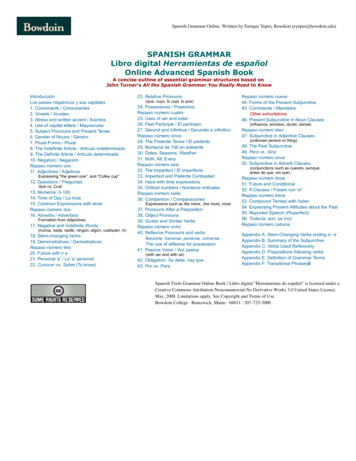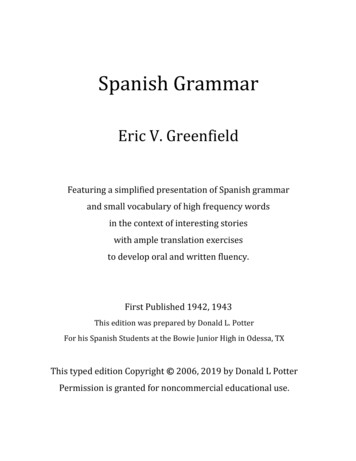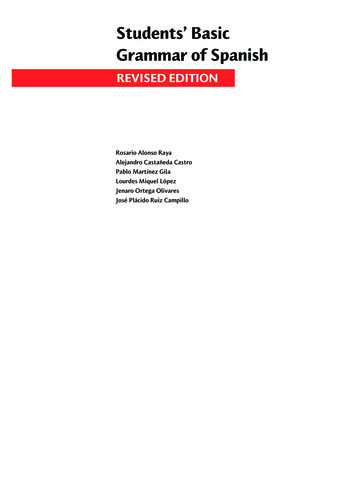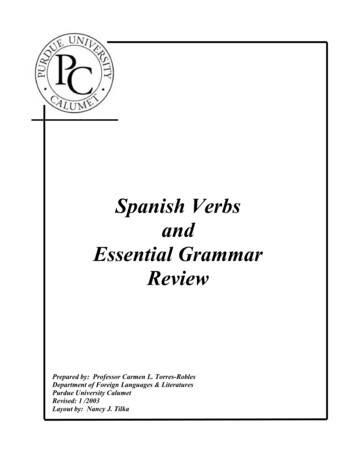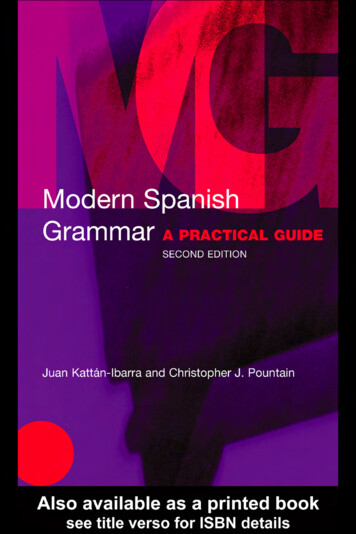
Transcription
ModernSPANISHGrammarSecond Edition
Routledge Modern GrammarsSeries concept and development – Sarah ButlerOther books in the series:Modern Spanish Grammar Workbook by Juan Kattán-Ibarra and Irene WilkieISBN 0–415–12099–3Modern French GrammarModern French Grammar WorkbookModern German GrammarModern German Grammar WorkbookModern Italian GrammarModern Italian Grammar Workbook
ModernSPANISHGrammarA practical guideSecond EditionJuan Kattán-Ibarraand Christopher J. Pountain
First published 1997by RoutledgeReprinted 1998, 1999, 2000, 2001, 2002Second edition published 2003by Routledge11 New Fetter Lane, London EC4P 4EESimultaneously published in the USA and Canadaby Routledge29 West 35th Street, New York, NY 10001Routledge is an imprint of the Taylor & Francis Group 1997, 2003 Juan Kattán-Ibarra and Christopher J. PountainThis edition published in the Taylor & Francis e-Library, 2005.“To purchase your own copy of this or any of Taylor & Francis or Routledge’scollection of thousands of eBooks please go to www.eBookstore.tandf.co.uk.”The authors assert their moral right to be identified as the authors of this workAll rights reserved. No part of this book may be reprinted or reproduced orutilized in any form or by any electronic, mechanical, or other means, nowknown or hereafter invented, including photocopying and recording, or inany information storage or retrieval system, without permission in writingfrom the publishers.British Library Cataloguing in Publication DataA catalogue record for this book is available from the British LibraryLibrary of Congress Cataloguing in Publication DataA catalog record for this book is available from the Library of CongressI SBN 0-203-42831-5 Master e-book ISBNISBN 0-203-44036-6 (Adobe eReader Format)ISBN 0–415–27303–X (hbk)0–415–27304–8 (pbk)
ContentsIntroductionGlossaryxviixixPart A Structuresv1 Pronunciation and spelling1.1 The Spanish alphabet1.2 Diphthongs1.3 Syllabification1.4 Sinalefa1.5 The written stress accent1.6 Punctuation1.7 Capital letters3366779102 Gender and gender agreements2.1 Masculine and feminine2.2 Plural2.3 General rules for gender2.4 Words which are both masculine and feminine2.5 Nouns which vary in gender2.6 Agreement classes of adjectives2.7 The neuter2.8 Lo1111111212121314153 Plurals and number agreement3.1 Plural forms3.2 Number agreement1616174 The articles4.1 Definite article4.2 Principal differences between the use of the definite articlein Spanish and English4.3 Definite article que and de4.4 The indefinite article1919202122
CONTENTSvi4.5 Principal differences between the use of the indefinitearticle in Spanish and English4.6 Use of the plural unos, unas22235 Adjectives5.1 Shortening of adjectives5.2 Adjective position5.3 Adjectives used as nouns5.4 Adjectives used as adverbs24242527276 Comparative forms of adjectives and adverbs6.1 Lack of distinction between ‘more . . .’ and ‘most . . .’6.2 Syntax of comparative constructions2828297 Numbers7.1 Cardinal numbers7.2 Ordinal numbers7.3 Expressions involving numbers303031328 Personal pronouns8.1 Subject pronouns8.2 Object pronouns8.3 Reduplicated pronoun structures343436399 Demonstratives9.1 Forms9.2 Order9.3 Usage4040404110 Possessives10.1 Forms10.2 Usage42424311 Relative pronouns11.1 Que11.2 El que/el cual, etc.11.3 Quien(es)11.4 Cuyo (adj.)454545464712 Interrogative and exclamatory forms12.1 ¿Cómo?/¡Cómo!12.2 ¿Cuál? and ¿Qué?/¡Qué!12.3 ¿Cuándo?12.4 ¿Cuánto?/¡Cuánto!4848495050
?¿Para qué?/¿Por qué?¿Qué tal?¿Quién(es)?¿Verdad?, ¿no?505051515113 Indefinite and negative pronouns and adjectives13.1 Alguno and ninguno13.2 Alguien and nadie13.3 Uno13.4 Algo and nada13.5 Cualquiera13.6 Quienquiera13.7 Todo525252535353545414 Adverbs14.1 Formation of adverbs in -mente14.2 Other adverbs55555615 Negation15.1 No15.2 Negative element following the verb15.3 Expressions requiring a negative15.4 No . . . sino . . .15.5 Negation of adjectives15.6 Negative questions5757575858585816 Verb forms16.1 The overall pattern595917 Use of the verb forms17.1 Present17.2 Perfect17.3 Imperfect17.4 Preterite17.5 Future17.6 Future perfect17.7 Conditional17.8 Conditional perfect17.9 Pluperfect17.10 Past anterior17.11 Infinitive17.12 Gerund17.13 Imperative7272737475767777787879798081
CONTENTS18 Use of the subjunctive18.1 The subjunctive in complements of verbs andverbal expressions18.2 The subjunctive after conjunctions18.3 The subjunctive in main clauses83869119 Sequence of tense19.1 In reported (indirect) speech19.2 Constructions involving the subjunctive93939520 Other forms of the verb and their uses20.1 Estar gerund20.2 Ir a infinitive20.3 Llevar gerund20.4 Acabar de infinitive20.5 Ir gerund20.6 Venir gerund20.7 Tener past participle969697979898989821 Modal auxiliary verbs and expressions21.1 Poder21.2 Deber (de)21.3 Saber21.4 Querer21.5 Tener que21.6 Haber de21.7 Haber que999910010110110210210222 Ser and estar22.1 Ser22.2 Estar10310310523 The reflexive23.1 Literal reflexive23.2 Reflexives with a conventionalized meaning23.3 Reciprocal reflexives23.4 Inherently reflexive verbs23.5 The reflexive corresponding to an English intransitive23.6 Reflexive verbs with prepositional objects23.7 The intensifying reflexive23.8 The impersonal reflexive23.9 The passive reflexive10810810810810910910911011111124 The passive24.1 Ser past participle112112viii83
Contents24.224.324.424.5Estar past participleThe passive reflexiveUse of indefinite subjectsBringing the object to the front of the sentence11311311411525 Prepositions25.1 Basic use of prepositions25.2 Groups of prepositions11611612926 Complementation26.1 Sentence complementation26.2 Infinitive complementation26.3 Gerund complementation13113113214027 Conjunctions27.1 Coordinating conjunctions27.2 Subordinating conjunctions14114114228 Word order28.1 Statements28.2 Questions145145146PART B FunctionsI Social contacts and communication strategiesix29 Making social contacts29.1 Greeting someone29.2 Conveying greetings29.3 Asking people how they are29.4 Introducing yourself and others29.5 Taking leave29.6 Expressing wishes29.7 Congratulating someone29.8 Using the phone29.9 Writing letters15315315415515615715916016116530 Basic strategies for communication30.1 Attracting someone’s attention and responding to acall for attention30.2 Starting up a conversation30.3 Requesting repetition and responding30.4 Making sure you understand and are understood30.5 Signalling that one understands the speaker30.6 Asking how to pronounce or spell a word170170171172173175175
CONTENTS30.730.830.930.10Interrupting a speakerUsing fillersChanging the subjectFormal development of a topic175176177178II Giving and seeking factual informationx31 Asking questions and responding31.1 Questions requiring a yes or no answer31.2 Questions seeking partial information31.3 Polite and indirect questions31.4 Negative questions31.5 Responding to a question with another question31.6 Responding to a yes or no question18518518718718818818932 Negating32.1 No verb/auxiliary32.2 Limiting the scope of negation32.3 Negating adjectives and nouns32.4 Other ways of expressing negation19119119219219333 Reporting33.1 Direct and indirect speech33.2 Indirect speech33.3 Reporting statements33.4 Reporting questions33.5 Reporting yes and no answers33.6 Reporting commands and requests19619619619820020120134 Asking and giving personal information34.1 Name34.2 Nationality and place of origin34.3 Marital status34.4 Age34.5 Date and place of birth34.6 Occupation, status or rank, religion and political affiliation20420420520620720720835 Identifying people, places and things35.1 Identifying oneself and others35.2 Identifying places35.3 Identifying things21021021121136 Describing36.1 Referring to a subject’s nature or identity212212
g about a subject’s nature or identityDescribing a state or conditionDescriptions involving an unspoken comparisonAsking and saying what something is made ofDescribing eventsDescribing facts or informationDescribing social mannersDescribing the weather21421521521621621721721737 Making comparisons37.1 Comparisons of inequality37.2 Comparisons of equality37.3 Comparing more than two objects21921922222438 Expressing existence and availability38.1 Asking and answering questions regarding existence38.2 Describing facilities38.3 Expressing availability22622622822839 Expressing location and distance39.1 Expressing location39.2 Asking and saying where an event will take or took place39.3 Indicating precise location39.4 Indicating distance23023023223223540 Expressing possessive relations40.1 Expressing ownership and possession40.2 Emphasizing possessive relations40.3 Expressing possessive relations involving parts of thebody and personal effects40.4 Asking whose something is40.5 Other ways of expressing possession23723723941 Expressing changes41.1 Talking about temporary changes41.2 Talking about long-lasting changes41.3 Talking about changes resulting from a natural process41.4 Talking about the result of a process of change41.5 Talking about changes caused by an action41.6 Other ways of expressing change24224224324424424524642 Describing processes and results42.1 Describing processes42.2 Describing results247247250240240241
CONTENTS43 Expressing cause, effect and purpose43.1 Enquiring about cause43.2 Giving reasons and expressing relationships of causeand effect43.3 Other ways of expressing relationships of cause and effect43.4 Enquiring about purpose43.5 Expressing purpose253253254256257258III Putting events into a wider contextxii44 Expressing knowledge44.1 Expressing knowledge of a fact44.2 Saying that one knows a person, a place or an object44.3 Expressing knowledge of a subject or a skill44.4 Getting to know, become acquainted with ormeeting someone44.5 Learning or finding out about something26326326426445 Remembering and forgetting45.1 Saying whether one remembers something or someone45.2 Asking people whether they remember somethingor someone45.3 Saying that one has forgotten something or someone45.4 Enquiring whether someone has forgotten something orsomeone26626646 Expressing obligation and duty46.1 Expressing obligation and duty with regard to oneselfand others46.2 Enquiring whether one is obliged to do something46.3 Expressing obligation in an impersonal way46.4 Other ways of expressing obligation and duty27227227427427447 Expressing needs47.1 Expressing needs with regard to oneself and others47.2 Asking people about their needs47.3 Expressing needs in an impersonal way47.4 Expressing strong need27627627827928148 Expressing possibility and probability48.1 Saying whether something is considered possibleor impossible48.2 Enquiring whether something is considered possible orimpossible282264265268270271282289
Contents49 Expressing certainty and uncertainty49.1 Saying how certain one is of something49.2 Enquiring about certainty or uncertainty29129129450 Expressing supposition50.1 Common expressions of supposition29629651 Expressing conditions51.1 Open conditions51.2 Unfulfilled conditions51.3 Other conditional expressions29929930130252 Expressing contrast or opposition52.1 Common expressions of contrast or opposition30630653 Expressing capability and incapability53.1 Enquiring and making statements about capability orincapability53.2 Enquiring and making statements about learned abilities31131131254 Seeking and giving permission54.1 Seeking permission54.2 Giving permission54.3 Stating that permission is withheld31431431731855 Asking and giving opinions55.1 Asking someone’s opinion55.2 Expressing opinions55.3 Enquiring about other people’s opinions55.4 Reporting on other people’s opinions31931932132532556 Expressing agreement, disagreement and indifference56.1 Expressing agreement56.2 Expressing disagreement56.3 Asking about agreement and disagreement56.4 Expressing indifference327327328329330IV Expressing emotional attitudes57 Expressing desires and preferences57.1 Expressing desires57.2 Enquiring about desires57.3 Expressing preferences and enquiring about preferences57.4 Expressing desires and preferences involving othersxiii333333336336338
CONTENTS58 Expressing likes and dislikes58.1 How to say you like or dislike something or someone58.2 Enquiring about likes and dislikes58.3 Other ways of expressing likes and dislikes34034034234359 Expressing surprise59.1 Set expressions59.2 Expressing surprise with regard to someone or something34634634760 Expressing satisfaction and dissatisfaction60.1 Expressing satisfaction60.2 Expressing dissatisfaction60.3 Enquiring about satisfaction and dissatisfaction34934935035161 Expressing approval and disapproval61.1 Expressing approval61.2 Expressing disapproval61.3 Enquiring about approval and disapproval35235235335362 Expressing hope62.1 Saying what one hopes or others hope to do62.2 Expressing hope with regard to others62.3 Expressing hope in reply to a question or as a statement35535535535663 Expressing sympathy63.1 Saying one is sorry about something63.2 Saying one is glad about something35835836064 Apologizing and expressing forgiveness64.1 Apologizing64.2 Expressing forgiveness36236236465 Expressing fear or worry65.1 Common expressions of fear65.2 Other ways of expressing fear36536536966 Expressing gratitude66.1 Expressing gratitude66.2 Responding to an expression of gratitude370370372V The language of persuasion67 Giving advice and making suggestions67.1 Giving advice and making suggestions not involvingthe speakerxiv375375
Contents67.2 Suggesting a course of action involving the speaker67.3 Asking for advice and suggestions37837968 Making requests68.1 Common expressions of request38138169 Giving directions, instructions and orders69.1 Giving directions69.2 Giving instructions69.3 Giving orders38538538738870 Making an offer or invitation and accepting or declining70.1 Making an offer or invitation70.2 Accepting or declining an offer or invitation70.3
Modern Spanish Grammar Workbook by Juan Kattán-Ibarra and Irene Wilkie ISBN 0–415–12099–3 Modern French Grammar Modern French Grammar Workbook Modern German Grammar



